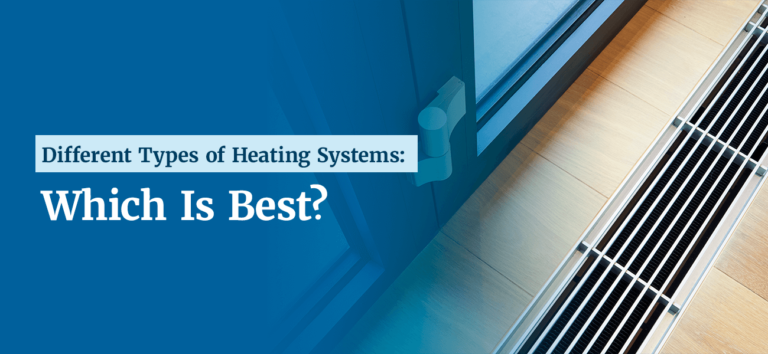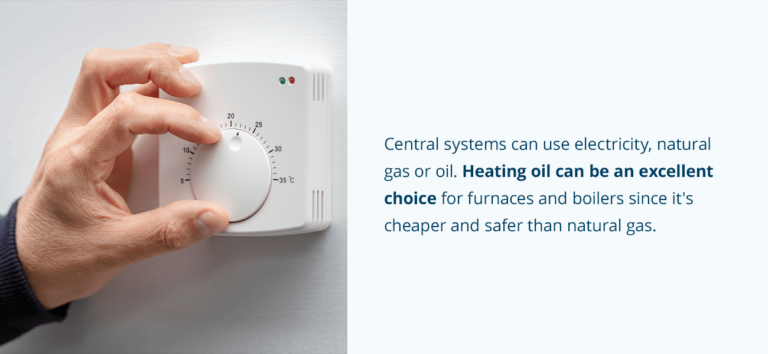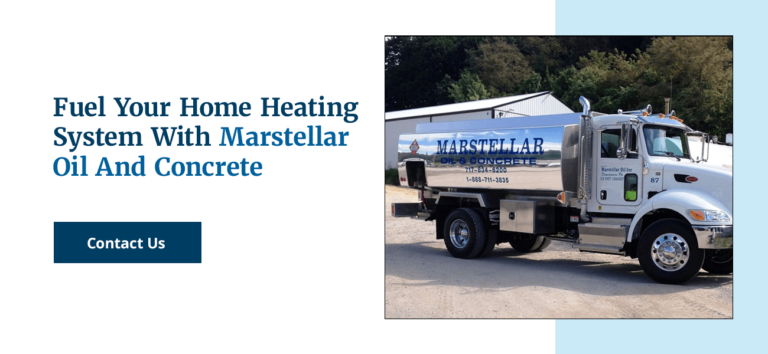
Whether it’s time to replace your old heating system or you’re looking for the best heating system for a northeast home, doing your research can help save you money. With so many options, it can be challenging to know where to start. Residential heating systems take up more of your energy bill than anything else — as much as 29% of your utility bill is heat. To help you find the perfect system, here’s an overview of the different types of home heating systems you’ll encounter.
Types of Home Heating Systems
Before you get into the different types of home heating systems, you should understand the basics of heating systems. Every heating system is made up of three parts:
- Control system: The control system manages heat distribution, usually through the thermostat.
- Heat distribution system: This system moves hot water, steam or warm air through the home.
- Heat source: The heat source provides water or warm air for heating.
Now that you have an overview of the system parts, let’s look at the options for home heating systems. There are three main types of systems:
- Central heating: Central heating uses a central heat source to generate heat. The heat is then transported through the home.
- Ductless heating: Ductless heat pumps use refrigerant lines instead of ducts to transport heat.
- Direct heating: Direct heat also doesn’t use ducts. Instead, it sits in the room where you want to heat and warms only that area.
There are several types of residential heating systems. The right one for your house will depend on your budget, location and needs. Efficiency is also a significant factor in selecting heating systems, so choose one that will perform efficiently for many years.
Central Heating Systems
Central heat is a common choice for new and old heating systems. These systems provide heat for an entire building or set of interior rooms, warming the whole house using a central heat source. The unit is typically isolated in a basement or attic. The system uses fuel to heat air or water, and the heat is then carried through the house using ducts or pipes.
Central systems can use electricity, natural gas or oil. Heating oil can be an excellent choice for furnaces and boilers since it’s cheaper and safer than natural gas. Installation costs for central systems vary from affordable to expensive. Because central systems require ductwork installation, they are more expensive upfront and require regular duct and central unit maintenance to keep heat flowing efficiently through the home.

There are three main kinds of central heating systems:
- Furnaces
- Boilers
- Heat pumps
Depending on your needs, you’ll have to consider the fuel, size, climate and efficiency when choosing a new heating system. The right central system should meet your heating needs comfortably and efficiently.
Furnaces
Central furnaces are a popular choice for U.S. household heating. Once the furnace warms the air, it blows the heated air through ducts or pipes and out of vents in the house. Furnaces can be powered by electricity, natural gas or heating oil. Older furnaces would lose a portion of their energy during the heating process, but newer systems can retain much more. In addition to their efficiency, furnaces are relatively affordable, making them a good home choice.
Boilers
Boilers heat water, not air, to provide central heating. Using pumps, hot water circulates through your home to radiators or other devices that generate heat. As the water moves, it loses heat, so it travels back to the boiler to be reheated and begin circulating again. Natural gas or heating oil generally fuels boilers. Boilers also have valves that control temperature and water flow — adjusting these values allows you to quickly and conveniently control the system’s heat aspects.
Heat Pumps
Heat pumps are two-way air conditioners that act as heating and cooling system. Heat is pulled in from outside and sent into the home. Instead of generating it themselves, heat pumps use electricity to move the heat in, so they’re an energy-efficient option for homes. Because they draw heat from outside, they don’t always work well in cold areas, so make sure you live in a suitable climate for a heat pump system.
There are two types of heat pumps — air and ground source. Air heat pumps use the air from inside and outside to warm the home. Ground source heat pumps or geothermal heat pumps pull heat from the groundwater or ground to warm your house. Geothermal heat is more expensive than air heat pumps since you have to drill into the ground to install the system.
Ductless Heating Systems
Ductless heating systems, also called ductless heat pumps, are easy to install. They have no ductwork and consist of an indoor and outdoor unit, although you’ll need one for each room of the home since there is no ductwork to transport heat. They’re more efficient than central heat and can often provide heat and air conditioning to your home. Instead of ducts, these systems use refrigerant lines to transport heat to your rooms. Some ductless systems are more expensive to install, so check your budget and needs when looking at the different types of ductless heating systems.
These systems let you control the temperature of each room and run on electricity. However, ductless systems are not as efficient in colder climates. They work best in milder climates and homes without existing ductwork. Some types of ductless systems include:
- Window air conditioners with heat
- Portable standing air conditioners with heat
- Mini-split heat pumps
Direct Heating Systems
Direct systems work best for heating a small area rather than warming an entire home. Direct heating doesn’t use ducts — instead, small units sit in each room and heat individual spaces to your comfort level. Direct heating can use electricity, oil, gas or wood as fuel. These heaters have some safety concerns, so avoid touching them or placing flammable objects nearby. Direct systems work best as supplementary heat when your system does not warm a room well enough when it’s cold.
Some direct heat options are:
- Space heaters
- Fireplaces
- Wood burning and pellet stoves
How to Choose The Most Efficient Home Heating System
When comparing the different types of residential heating systems, efficiency plays an important role. The more efficient your system, the better it will heat your home without wasting energy and losing money. Central and heat pump systems are rated for their efficiency, so read their ranking or look for an Energy Star rating to ensure you’re choosing an efficient model.
Furnace and boiler efficiency is measured by the annual fuel utilization efficiency (AFEU). The AFEU measures how efficient a system is at converting heat into energy during a year. If an AFEU is 80%, then 80% of the energy in the unit’s fuel becomes heat for your house, while 20% is lost or wasted. Electric furnaces or boilers will have AFEUs of 95% and above, but electricity is often expensive, making many electric heat systems less economical for homes.
Air heat pumps often use the heating season performance factor (HSPF) to indicate efficiency. It’s more challenging to understand, but the HSPF rating is the ratio of the heat output during the heating season over the total electrical energy used by the heater. The higher the HSPF, the more efficient the unit.
Once you have a heating system, make sure to make energy-saving decisions. Reduce the strain on your system and the cost of your energy bill by lowering the heat and regularly changing furnace filters. Proper maintenance can help your unit run efficiently for many years without sacrificing comfort.
Fuel Your Home Heating System With Marstellar Oil And Concrete
If you live in central Pennsylvania and are looking for a safe, affordable fuel option for your heating system, count on Marstellar Oil for your heating needs. As a locally-owned company, we know the value of receiving fuel safely and quickly, which is why we offer online scheduled and same-day delivery rush options for heating oil. We also have an online oil price comparison tool to ensure you get the best value for your fuel.
Contact us today with any heating oil questions, and trust Marstellar Oil to provide you with safe, affordable heating system fuel when you need it.



